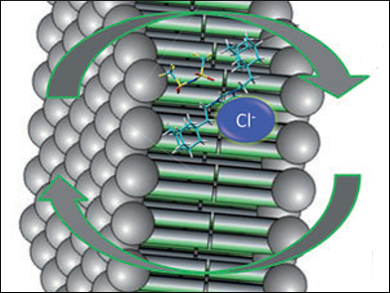Ion transport across phospholipid membranes is a process common to many forms of life, and the regulation of ion concentration both inside and outside cells is crucial to their functionality. The controllable transmembrane transport of chloride has many important therapeutic applications for illnesses, including cystic fibrosis and diarrhoea.
Andreea Schmitzer and colleagues, Université de Montréal, Canada, have developed a modular chloride transport process based on host-guest interactions between an imidazolium chloride carrier and β-cyclodextrin (β-CD). The adamantyl-functionalized imidazolium salt acts as a chloride carrier. The team tested the approach in chloride transport assays conducted with large unilamellar vesicles of egg yolk phosphatidyl choline, and used lucigenin as a fluorescent probe which is quenched by chloride.
In the presence of β-CD, an inclusion complex forms due to host-guest interaction between the adamantyl moieties and the cavity of β-CD, which causes total inhibition of the imidazolium salt’s transmembrane movement, thus preventing chloride transport. This system has the potential to allow reversible modulation of chloride transport for therapeutic and antimicrobial applications.
- Host-Guest Strategy to Reversibly Control a Chloride Carrier Process with Cyclodextrins,
Julien Gravel, Julie Kempf, Andreea Schmitzer,
Chem. Eur. J. 2015.
DOI: 10.1002/chem.201503714




